Most machine learning courses teach you to build models in Jupyter notebooks and stop there. You learn regression, classification, and neural networks, yet when it’s time to deploy your model to production, you’re left figuring it out alone. The gap between training a model and running it in a real application can derail your ML career before it starts.
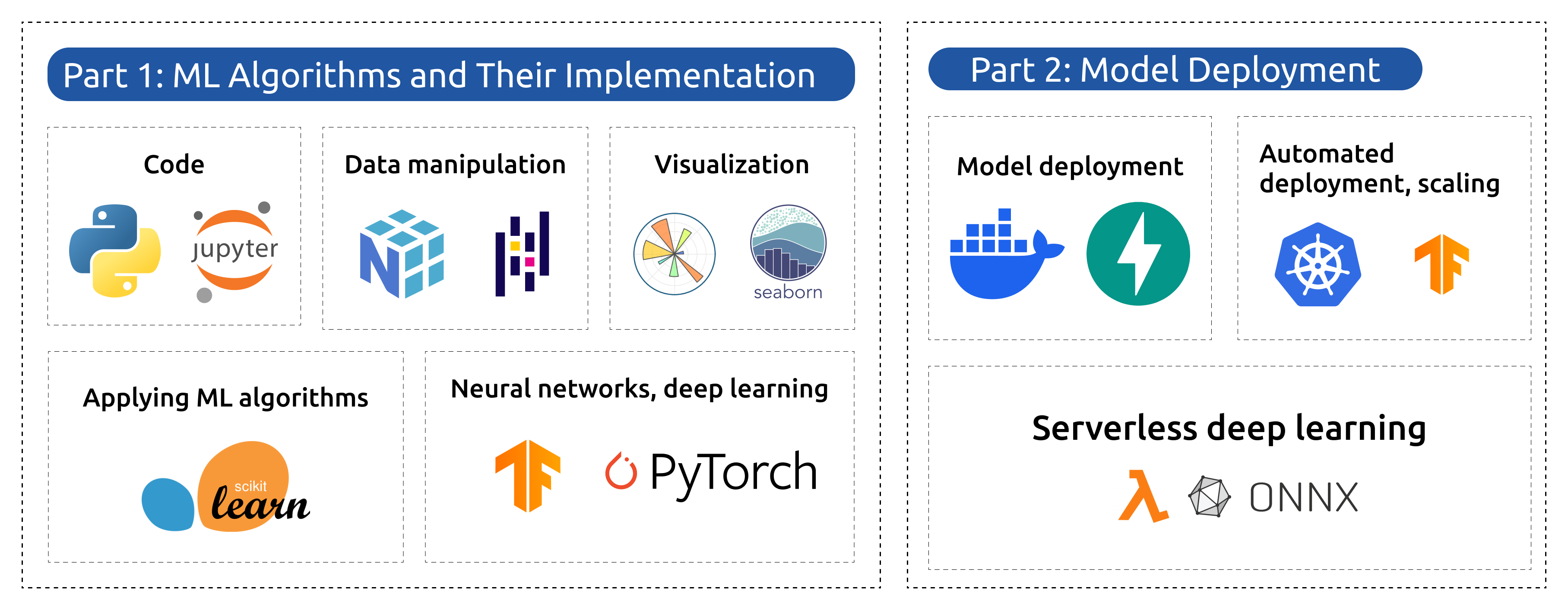
ML Zoomcamp solves this by teaching you complete machine learning engineering, covering the entire pipeline: from building models with Python to deploying them in production environments. You’ll master key ML algorithms like linear regression, logistic regression, decision trees, and deep learning with TensorFlow and PyTorch, then learn to containerize with Docker, build APIs with FastAPI, and scale with Kubernetes and AWS Lambda.
With this machine learning course, you’ll get hands-on experience with the entire ML workflow and two portfolio-ready projects showing you can build, deploy, and maintain production machine learning systems.
TL;DR: Machine Learning Zoomcamp is a free 4-month course teaching machine learning engineering. You’ll learn Python ML basics through to production deployment, build real projects, and join a supportive community. The next cohort starts on September 15, 2025. Join the course here.
Table of Contents
- What is Machine Learning Zoomcamp?
- Why Learn Machine Learning?
- Who Is This Course For (and What Are the Prerequisites)?
- Course Curriculum: What You’ll Learn
- How the Machine Learning Zoomcamp Works
- DataTalks.Club Community
- Machine Learning Zoomcamp vs. Bootcamp
- How to Get Started
- Testimonials
- Frequently Asked Questions
What is Machine Learning Zoomcamp?
Machine Learning Zoomcamp is a free machine learning course that teaches you to build and deploy machine learning models in production environments—bridging the gap between training models in notebooks and running them in real-world applications.
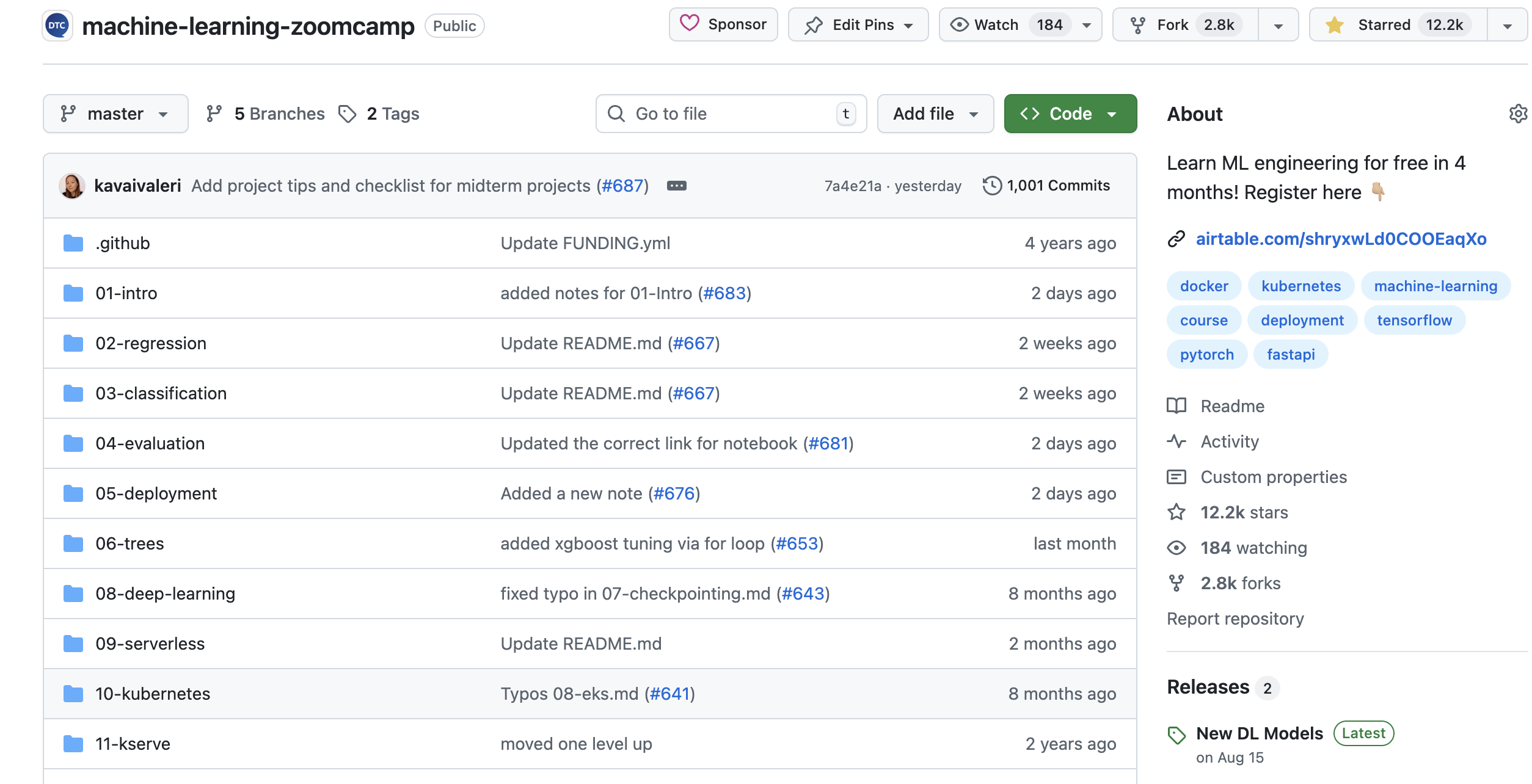
Machine Learning Zoomcamp GitHub repository showing the course materials
While ML Zoomcamp covers the fundamental machine learning algorithms you need to know, it focuses heavily on the practical skills that most courses skip. Instead of stopping at model training, you’ll learn the complete production workflow:
-
Model Persistence and Containerization: Learn how to save trained models properly and package them using Docker containers, making your applications portable and reproducible. You’ll understand why containerization is essential for production deployments and how tools like Docker and Kubernetes solve real deployment challenges.
-
API Development and Service Integration: Discover how to transform your models into web services using FastAPI, enabling other applications to make predictions via HTTP requests. You’ll learn to integrate your models into existing systems and build complete end-to-end applications with tools like FastAPI, Docker, Kubernetes, and AWS Lambda.
-
Deployment Strategies: Understand the fundamental differences between traditional server-based deployments (using virtual machines or Kubernetes clusters) and serverless architectures (like AWS Lambda). You’ll learn the trade-offs, cost implications, and when to choose each approach for your specific use case.
Why Learn Machine Learning?
Machine learning has become a foundational technology across industries, driving the rapid expansion of the global AI market valued at $184 billion in 2024 and projected to reach $826 billion by 2030.
As a subset of artificial intelligence, machine learning is essential for modern AI applications. It enables systems to learn from data and make predictions without hard-coded rules. This technology powers many applications you interact with daily: language models like ChatGPT that process and generate text, image generation tools like DALL-E, computer vision systems in autonomous vehicles, and recommendation engines used by streaming and e-commerce platforms.
This widespread adoption has created significant demand for skilled professionals. According to the World Economic Forum’s Future of Jobs Report 2025, AI and machine learning specialists are among the top three fastest-growing roles between 2025 and 2030, with an expected global net growth of 82%.
Who Is This Course For (and What Are the Prerequisites)?
Machine learning is a technical field that requires understanding of programming and mathematical concepts. While you don’t need a PhD in mathematics or computer science to start learning, you should be prepared to work with concepts from linear algebra, calculus, and statistics as you progress. You can start with basic understanding, but you’ll eventually need to grasp these concepts to debug models and make informed decisions.
The learning curve can be steep. Understanding why your model isn’t working, dealing with messy real-world data, and troubleshooting deployment issues takes time and patience. You’ll need to be willing to struggle through problems and dedicate time to consistent practice.
Four key elements needed for success in machine learning. You don't need to master everything before starting, but having these in place will help you progress effectively.
If this sounds like you, you’re in the right place:
- You are comfortable with programming (1+ year)
- You are comfortable with mathematical thinking
- You are willing to struggle through problems
- You are willing to dedicate time to consistent practice (expect several months to build competence)
People from various backgrounds enter the field: software developers, data analysts, researchers, and career changers with technical experience. Success typically depends on having a foundation in programming, dedicating time to study and practice, and working through problems systematically.
Course Prerequisites
This course is designed for anyone with programming experience who wants to learn machine learning engineering. You don’t need a background in mathematics, statistics, or data science to get started.
The only requirement for this course is prior programming experience (1+ year) and familiarity with the command line. If you’re completely new to programming, consider spending a few weeks learning the basics before starting the course.
This course bridges the gap between theoretical ML knowledge and practical engineering skills, making it ideal for professionals who want to deploy models in real-world applications.
The course is particularly suited for:
- Software developers and engineers who want to add machine learning to their skillset
- Data analysts looking to move into machine learning roles
- Students in computer science or related fields seeking practical ML skills
- Career changers with programming experience interested in AI and data science
- Technical professionals who want to understand how to deploy ML models in production
While having experience with Python is helpful, the course covers the essential libraries you’ll need. The key requirement is being comfortable with programming concepts and willing to commit time to learning and completing projects.
Course Curriculum: What You’ll Learn in the Machine Learning Zoomcamp
The course is divided into two main parts, carefully designed to build both your theoretical knowledge and practical skills.
Part 1: Machine Learning Foundations
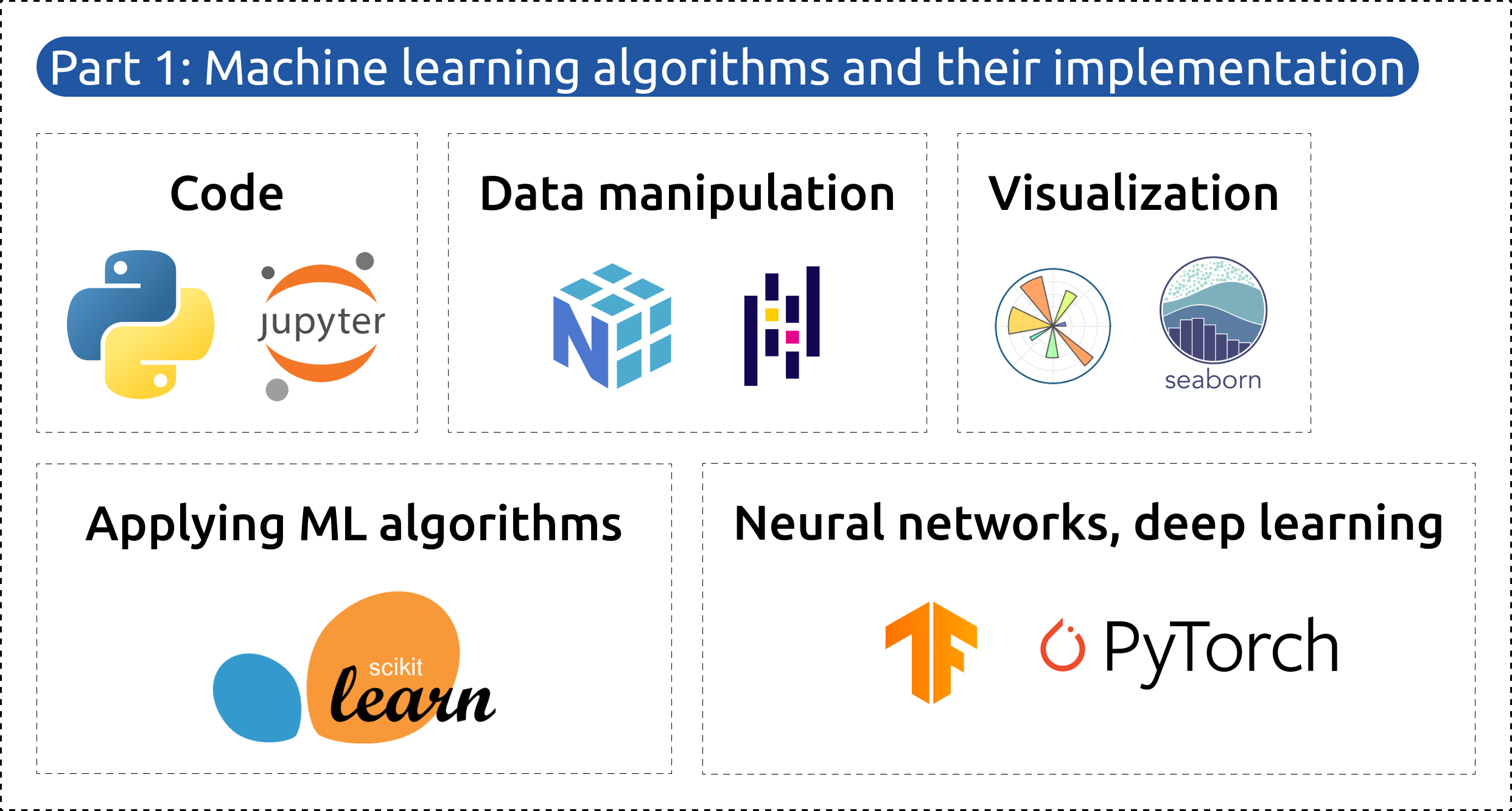
Part 1 focuses on core machine learning concepts and their practical implementation using Python.
| Topic | Description | Tools |
|---|---|---|
| Linear Regression and Feature Engineering | Master feature creation, categorical variable handling, and regularization techniques | NumPy, Pandas, Scikit-Learn |
| Classification with Logistic Regression | Learn feature importance and model evaluation | Scikit-Learn, Matplotlib |
| Decision Trees and Ensemble Methods | Explore gradient boosting and XGBoost implementation | XGBoost, Scikit-Learn |
| Neural Networks and Deep Learning | Build CNNs and implement transfer learning | TensorFlow, PyTorch, Keras |
We’ll also use Jupyter Notebooks for development, and Matplotlib and Seaborn for visualization.
Part 2: Production Deployment
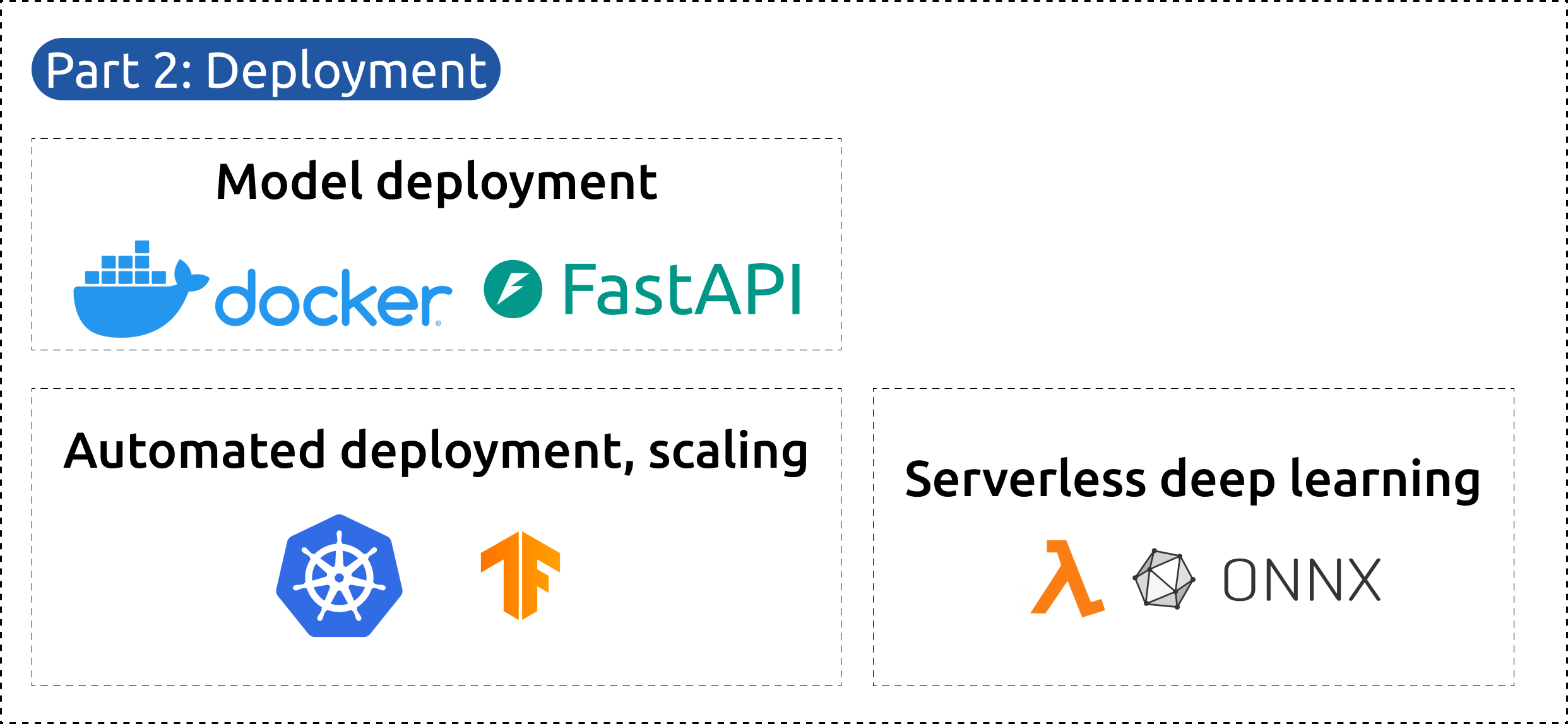
Part 2 focuses on model deployment, which involves putting machine learning models into production:
| Topic | Description | Tools |
|---|---|---|
| Model Deployment | Move models from notebooks to services and applications | FastAPI, Pipenv, Docker |
| Serverless Deep Learning | Deploy models efficiently using serverless architecture | AWS Lambda, ONNX Runtime |
| Container Orchestration | Automate deployment, scaling, and management of containerized applications | Kubernetes, TensorFlow Serving |
| KServe (optional) | Advanced deployment capabilities for production ML systems | KServe |
Capstone Project
During ML Zoomcamp, you’ll finalize and submit two capstone projects:
-
Midterm project in the middle of the course
-
Capstone project 1 and/or Capstone project 2 at the end of the course
These projects allow you to apply everything you’ve learned and make a great addition to your GitHub profile. You’ll choose a problem that interests you, find a suitable dataset, develop your model, and deploy it as a web service.

Students from previous cohorts built a wide range of projects. For example, one graduate created a blood cell classifier for cancer prediction and another built a waste classifier with over 15,000 images, achieving 93% accuracy.

How the Machine Learning Zoomcamp Works
Theory and Practice
Our lectures make machine learning theory accessible and engaging through real-world examples. We provide code demonstrations directly in the lectures to illustrate the implementation of concepts, making it easier to apply them in your projects.

GitHub Repository: The Central Hub of the Course
All course materials live in the GitHub repository. It serves as a central hub for the course, providing easier navigation through all course materials.

Machine Learning Zoomcamp GitHub repository: your central hub for all course materials
The lectures are pre-recorded and available on YouTube in our official Machine Learning Zoomcamp YouTube Playlist, so you can watch at your own pace.
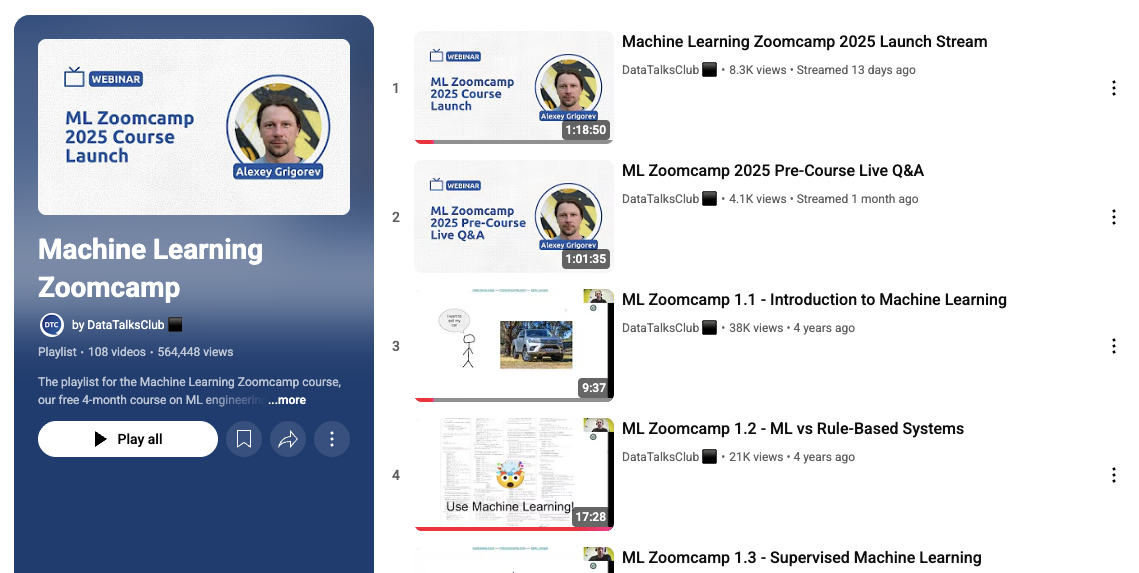
Machine Learning Zoomcamp YouTube playlist with all course lectures
Homework Assignments
To strengthen your understanding of the course material, we provide homework assignments for each module.
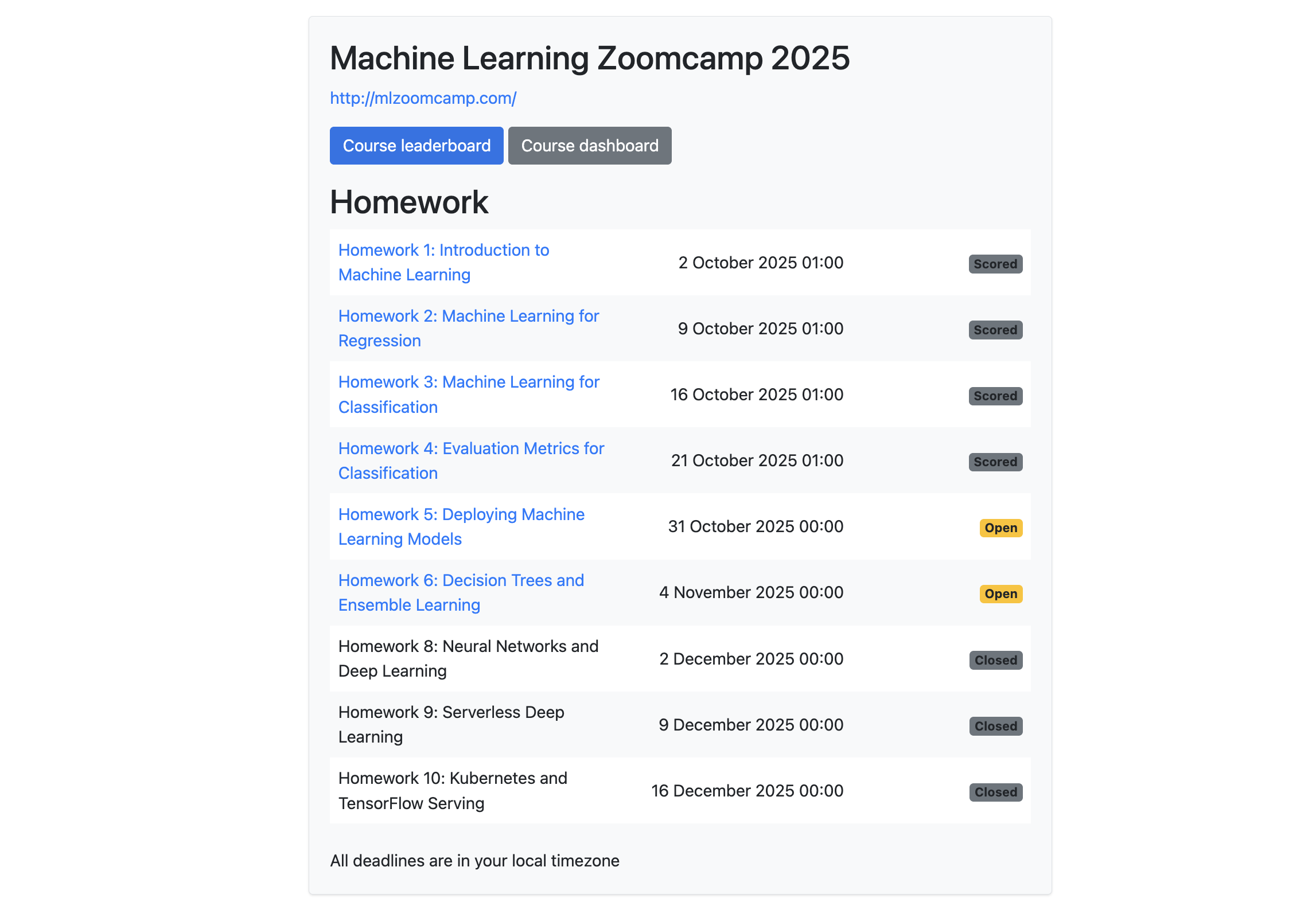
ML Zoomcamp schedule showing the course schedule and submission deadlines
While these assignments don’t contribute to your certification, they serve as valuable practice opportunities.
Your performance is recorded on an optional anonymous leaderboard, fostering healthy competition among participants and encouraging you to strive for excellence.
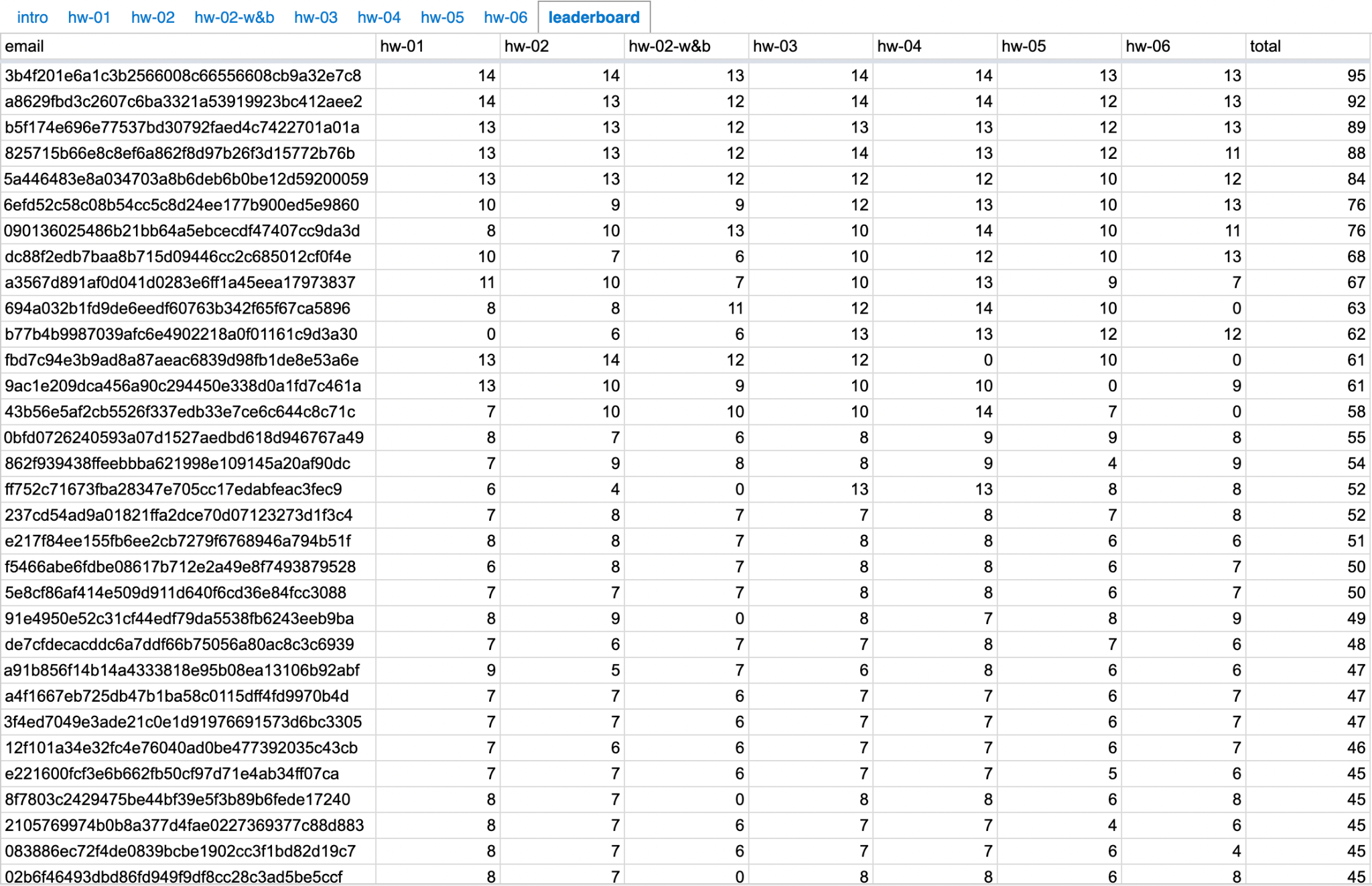
Course leaderboard displaying student progress and achievements anonymously
You can earn additional points through learning in public, the process of documenting and sharing your journey on blogs, YouTube, or social media platforms. Our upcoming section explores this concept in detail.
Learning in Public
A unique feature is our “learning in public” approach, inspired by Shawn @swyx Wang’s article. We believe that everyone has something valuable to contribute, regardless of their expertise level.
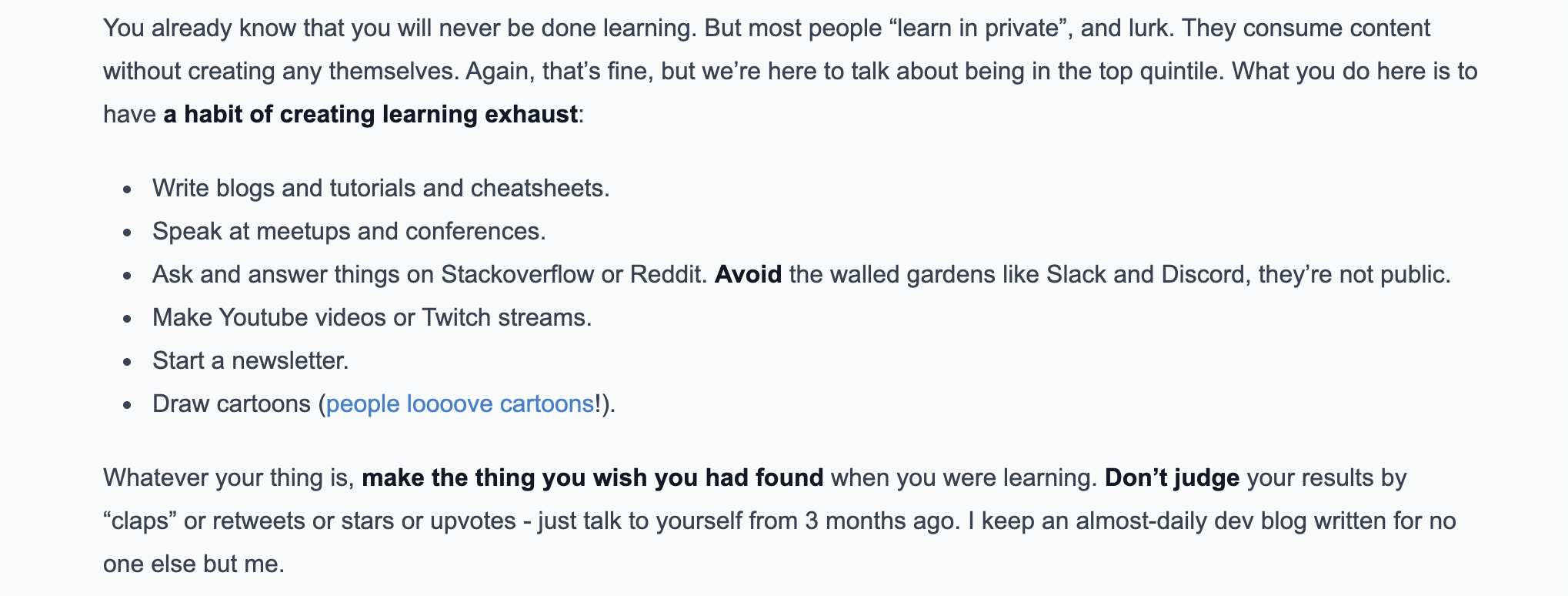
Throughout the course, we actively encourage and incentivize learning in public. By sharing your progress, insights, and projects online, you earn additional points for your homework and projects.

This not only demonstrates your knowledge but also builds a portfolio of valuable content. Sharing your work online also helps you get noticed by social media algorithms, reaching a broader audience and creating opportunities to connect with individuals and organizations you may not have encountered otherwise.
Many of our graduates have shared that their social media presence has helped them attract job offers and collaborations.
How to Get a Certificate
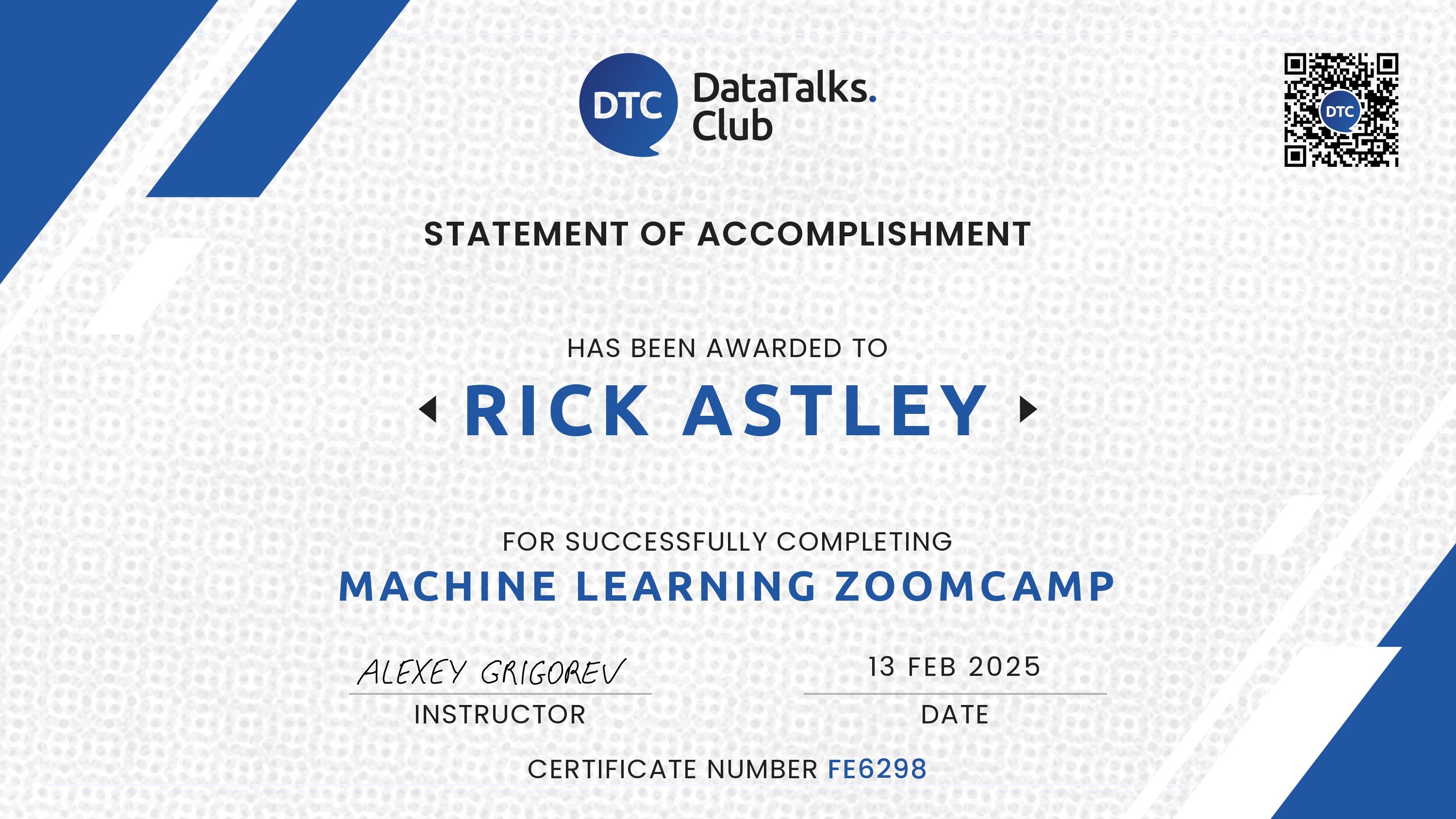
Machine Learning Zoomcamp certificate awarded upon successful completion
To receive a certificate, you’ll need to complete and submit 2 projects:
- Complete 2 projects: Submit either a midterm project and a capstone project, OR two capstone projects
- Submit on time: Meet the project submission deadlines to qualify for certification
- Peer review: Evaluate and provide feedback on 3 fellow students’ projects during the peer review process
What is DataTalks.Club Community? A Place to Connect and Learn with Other Machine Learning Professionals
DataTalks.Club is a global community of 80,000+ data professionals who connect on Slack to share knowledge, ask career questions, and discuss everything from analytics and visualization to machine learning and data engineering. As one of the largest digital groups dedicated to data, it’s where you’ll find data scientists, ML engineers, data analysts, and enthusiasts at all career stages.
When you join a cohort, the dedicated course channel becomes your home base. Here, you’ll troubleshoot problems with peers working through the same challenges and share your progress and insights.
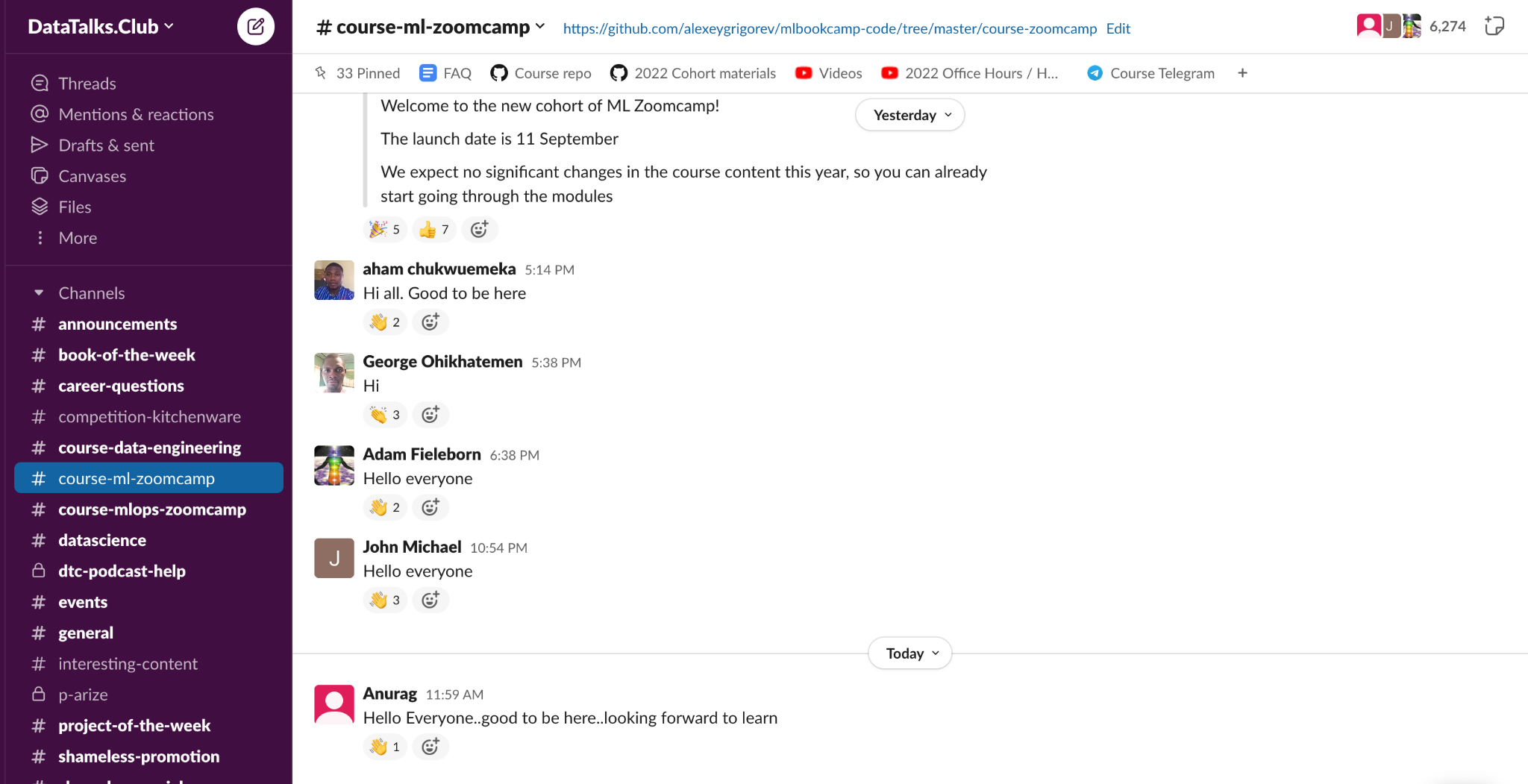
Beyond peer support, there are two ways to get help: our FAQ repository covers common questions and technical issues, and the @ZoomcampQABot in Slack provides quick answers when you need them.
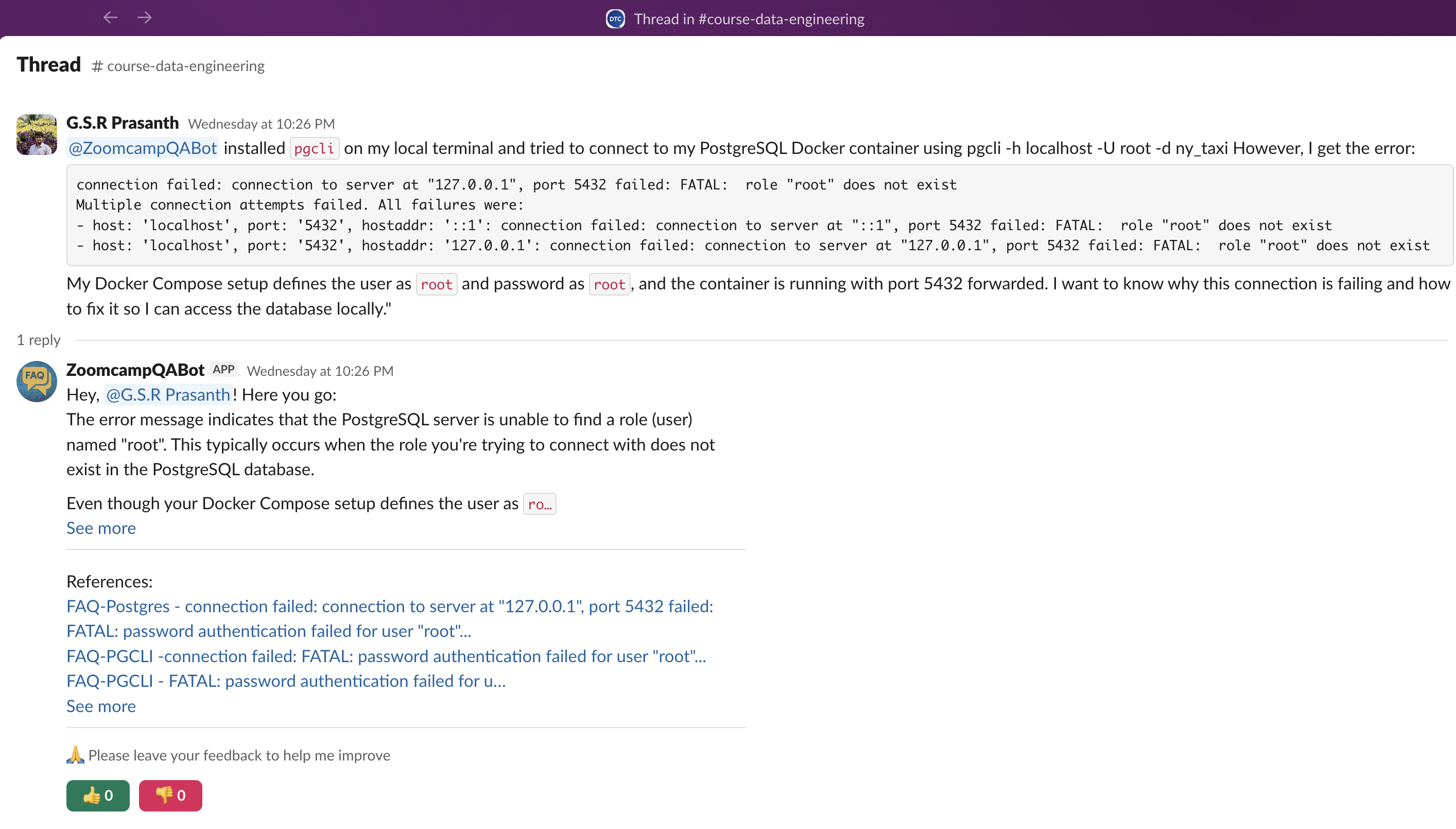
Machine Learning Zoomcamp QABot in Slack providing quick answers when you need them
Machine Learning Zoomcamp vs. Bootcamp: What’s the Difference?
We often get asked what the difference is between the Machine Learning Zoomcamp and paid bootcamps.
Below, we list the key features of the Machine Learning Zoomcamp and how they compare to paid bootcamps.
| Feature | ML Zoomcamp (Cohort) | ML Zoomcamp (Self-paced) | Paid Bootcamps |
|---|---|---|---|
| Cost | Free | Free | $2,000–$10,000+ |
| Format | 4-month cohort with fixed schedule | Learn anytime at your own pace | Fixed schedule, instructor-led |
| Homework | Weekly scored assignments | Available but no scoring | Weekly with instructor feedback |
| Projects | Capstone project with peer review and scoring | Build on your own, no evaluation and scoring | Instructor-reviewed projects |
| Certificate | Yes, after completing project + peer reviews | No certificate | Certificate of completion |
| Community Support | Active Slack + optional live Q&A sessions | Slack community only | Instructor-led, 1:1 or group mentorship |
| Learning in Public | Encouraged with bonus points | Optional | Rarely emphasized |
| Timeline | 4 months (Sep–Dec 2025) | Flexible, self-paced | Typically 12–24 weeks |
| Best For | Career switchers or experienced engineers wanting community and accountability | Self-motivated learners exploring machine learning | Those needing intensive structured mentorship and guidance |
How to Get Started with the Machine Learning Zoomcamp
To get started with ML Zoomcamp, you can either join a live cohort or learn at your own pace.
All course materials are freely available in the Machine Learning Zoomcamp GitHub repository, where each module has its own folder (e.g., 01-intro, 03-classification). Cohort-specific homework and deadlines are organized in the cohorts directory. All lectures are pre-recorded and available in our official Machine Learning Zoomcamp YouTube Playlist.
Learn at Your Own Pace
The self-paced mode lets you start anytime and learn at your own pace. You’ll get full access to all course materials and can join the DataTalks.Club Slack community for support on the #course-ml-zoomcamp channel. Homework assignments and solutions are available on the course platform, and you can build projects for your portfolio.
Remember, self-paced learning does not include homework submissions, project evaluations, or the ability to earn a certificate. To receive certification, you need to join an active cohort.
Join a Live Cohort
2025 Cohort: Starts September 15, 2025. Register here
The live cohort runs once per year from September through December. When you join a live cohort, you’ll work through the same materials as self-paced learners, but with the added structure of a published schedule and the energy of hundreds of peers progressing alongside you.
Each module typically spans one week. You’ll watch the lectures, complete hands-on exercises, and submit a homework assignment. Your submissions get scored automatically and appear on an anonymous leaderboard, creating friendly competition and helping you track your progress.
After completing all modules, the project phase begins. You’ll build your own end-to-end machine learning project, submit it through our form, and peer-review at least three other students’ projects while yours gets reviewed by your peers. This reciprocal process gives you valuable feedback on your work and exposes you to different approaches and solutions you might not have considered.
Even if you join after the official start date, you can still follow along—though some homework forms may already be closed. All active deadlines are listed on the course platform.
To earn a certificate, you’ll need enough time to complete 2 projects (either a midterm project and a capstone project, OR two capstone projects) and the required peer reviews. Details are in the How to Get a Certificate section.
Ready to join ML Zoomcamp? Here’s how it works:
- Register for the course, you’ll be automatically accepted into the next cohort
- Join the DataTalks.Club Slack community and the
#course-ml-zoomcampchannel for updates, questions, and peer support - (Optional) Get a head start by exploring the GitHub repository and watching lectures before the cohort officially begins
- When the cohort starts, you’ll receive an email with the full schedule and submission deadlines
- Follow the weekly rhythm: watch lectures, complete exercises, submit homework
- Complete and submit 2 projects (either midterm + capstone OR two capstones), then peer-review three other projects
- Receive your certificate once your projects pass peer review
The entire journey takes 4 months from start to certificate, and you’ll be part of a global cohort tackling the same challenges at the same time.
Testimonials
Machine Learning Zoomcamp was exhaustive, with very comprehensive content that covered concepts in depth. You can learn everything from the simplest concepts to preparing and deploying an ML model for production. Additionally, the entire community behind this course is highly participative and collaborative. I would like to thank Alexey Grigorev for all the knowledge he shared with us and his team for providing the support we needed to solve each problem we faced.
Machine Learning Zoomcamp has been an incredible journey, thanks to the expert guidance of Alexey Grigorev. Hugely grateful to Alexey, Timur, and the entire DataTalksClub team for this course, and to my cohort batchmates for the invaluable support that enriched my learning experience. I’m thankful for this programme, which provided challenging coursework that is taught in a very structured and lucid way. The timely assignments & hands-on projects instill the sense of timely delivery, besides equipping us with practical acumen to solve real-life problems.
Balancing the intensive Machine Learning Zoomcamp with my other engagements was no easy task, but the experience deepened my expertise in machine learning engineering, reinforced my passion for ML deployment and cloud technologies, and strengthened my resilience in handling real-world ML challenges. Thank you, Alexey Grigorev, for this course!
Highly recommend the ML Zoomcamp for anyone wanting a structured path to production-ready machine learning. A big thank you - Alexey Grigorev and to the team at DataTalksClub for providing such a well-structured and engaging course.
A huge thank you to Alexey Grigoriev for creating such an amazing course—and making it free! It’s truly inspiring.
Huge thanks to Alexey Grigorev and the DataTalksClub community for the incredible support and clarity throughout. The open-source spirit and collaborative notes made the learning experience even richer.
Frequently Asked Questions
The course runs for 4 months (September - December) and is divided into two main parts: Part 1 covers ML foundations (regression, classification, decision trees, neural networks with TensorFlow and PyTorch), and Part 2 focuses on production deployment (FastAPI, Docker, Kubernetes, AWS Lambda, serverless architectures). You’ll complete weekly homework assignments and 2 projects (either midterm + capstone OR two capstones). Expect to dedicate around 10 hours per week for coursework and projects. Learn more about the curriculum.
The 2025 edition features several major updates: 1) Deployment module updated to FastAPI (replacing Flask) with modern deployment tools, 2) Neural networks are taught with PyTorch (theory videos in Keras are retained, with additional PyTorch implementation videos), and 3) Deep learning deployment uses ONNX Runtime on AWS Lambda (replacing TensorFlow Lite). These updates reflect current industry best practices and tools.
You can choose between two learning paths: self-paced learning, where you can start immediately with pre-recorded materials freely available on GitHub and learn at your own pace with Slack community support, or joining our live cohort starting on September 15, 2025, to learn alongside peers with structured deadlines, submit homework for automatic scoring, complete 2 peer-reviewed projects (either midterm + capstone OR two capstones), and earn a certificate. Certificates are only available for cohort participants. Learn more about getting started.
The live cohort includes a structured learning path with deadlines, automatically scored homework assignments, peer interaction and community support through Slack, the opportunity to earn a certificate through submitting 2 projects (either midterm + capstone OR two capstones) and peer review, and access to all pre-recorded course materials on YouTube. See how it works.
To earn a certificate, you’ll need to complete and submit 2 projects: either a midterm project and a capstone project, OR two capstone projects. You’ll also need to review 3 peers’ projects by the deadline. Projects must be completed individually, and you must be part of a cohort to be eligible.
All homework assignments are automatically scored when you submit your answers through the homework form. You’ll see your results on an anonymous leaderboard, which fosters healthy competition among participants. You can earn additional bonus points through “learning in public”—sharing your progress, insights, and projects on social media, blogs, or YouTube. While homework doesn’t count toward certification, it provides valuable practice and helps you track your progress throughout the course.
Yes! While you might miss some homework deadlines, you can still join and get certified by completing 2 projects (either midterm + capstone OR two capstones) and the required peer reviews. All course materials remain accessible.
Machine learning has become a foundational technology driving the global AI market, valued at $184 billion in 2024 and projected to reach $826 billion by 2030. ML powers applications you use daily: ChatGPT, DALL-E, autonomous vehicles, and recommendation engines on streaming platforms. According to the World Economic Forum’s Future of Jobs Report 2025, AI and machine learning specialists are among the top three fastest-growing roles between 2025 and 2030, with an expected global net growth of 82%. The demand for skilled ML professionals continues to grow across all industries. Learn more about why learn machine learning.
You should be familiar with basic Python concepts like variables, libraries, and Jupyter notebooks. If you need to brush up, we recommend taking our Introduction to Python course first.
Join our active Slack community of 80,000+ data professionals on the #course-ml-zoomcamp channel. You can troubleshoot problems with peers, share your progress, ask questions, and get help from the @ZoomcampQABot. The course also has a comprehensive FAQ repository covering common questions and technical issues. Sharing your journey on social media with #mlzoomcamp earns you bonus points and helps build your online portfolio. Learn more about the community.
The course is suitable for anyone with programming experience (1+ year) and command line familiarity. You don’t need a PhD in mathematics or prior ML experience—the course starts from first principles with a gentle math refresher. However, machine learning is technical and requires dedication. You’ll work with concepts from linear algebra, calculus, and statistics. The learning curve can be steep, and you’ll need patience to debug models, handle messy data, and troubleshoot deployment issues. The course is ideal for software developers, data analysts, CS students, and career changers with technical backgrounds. Learn more about prerequisites and who can learn machine learning.
You’ll need a laptop with an internet connection and basic tools installed (Python, Git, Docker). The course uses Jupyter Notebooks for development, and you’ll work with Python libraries including NumPy, Pandas, scikit-learn, TensorFlow, PyTorch, and XGBoost. For deployment, you’ll use Docker, FastAPI, and optionally cloud platforms like AWS Lambda and Kubernetes. For deep learning sections, cloud resources may be recommended for intensive computations.
While all course materials are freely available for self-paced learning on GitHub, joining a cohort offers additional benefits: a structured timeline with regular deadlines, the ability to submit homework for automatic scoring and appear on the leaderboard, submit 2 projects (either midterm + capstone OR two capstones) for peer evaluation, active peer learning and discussion in Slack, the opportunity to earn a certificate, and a shared learning experience with others facing similar challenges. Self-paced learners can access all materials and the Slack community but cannot submit homework, participate in project evaluations, or earn certificates. Many students find the cohort structure helps them stay motivated and complete the course successfully. See the comparison.
All course materials on GitHub, videos on YouTube, and recordings remain available after the cohort ends, and you can learn at your own pace. You’ll have access to the Slack community for support. However, self-paced learning does not include homework submissions, project evaluations, or the ability to earn a certificate. To receive a certificate, you need to join an active cohort.
There are no office hours—all lectures are pre-recorded and available in the YouTube playlist, so you can watch them whenever it suits you.
All course materials are in the ML Zoomcamp GitHub repository. Each module has its own folder (for example, 01-intro or 03-classification), while cohort-specific homework and deadlines are located in cohorts/2025.
Occasionally, additional workshops or updated implementation videos are released—there will be additional announcements if this happens.
To maximize the course’s career impact, we recommend starting your project planning early and building portfolio-worthy projects that solve real problems. Stay engaged with the Slack community and share your learning journey on social media using #mlzoomcamp. Take time to review and learn from other students’ projects. When job hunting, use your projects to demonstrate practical skills in applications and interviews—many of our alumni have successfully leveraged their course projects to showcase their machine learning capabilities during the hiring process.
The Machine Learning Zoomcamp is a free machine learning engineering course by DataTalks.Club that teaches you to build and deploy ML models in production environments—bridging the gap between training models in notebooks and running them in real-world applications.
This 4-month course covers the complete ML workflow: from fundamental algorithms (linear regression, logistic regression, decision trees, neural networks) to production deployment (Docker, FastAPI, Kubernetes, AWS Lambda). You’ll learn model persistence, containerization, API development, and deployment strategies while building two portfolio-ready projects. All materials are open and available on GitHub. Learn more.
Unlike most ML courses that stop at model training in Jupyter notebooks, ML Zoomcamp teaches the complete production workflow. You’ll learn practical deployment skills that most courses skip: model persistence and containerization with Docker, API development with FastAPI for turning models into web services, and deployment strategies including both server-based deployments (Kubernetes) and serverless architectures (AWS Lambda). You’ll understand trade-offs, cost implications, and when to choose each approach. The course emphasizes hands-on learning with real projects that demonstrate you can build, deploy, and maintain production ML systems—not just train models.
Yes, ML Zoomcamp is completely free. There are no hidden costs, no tuition fees, and no paid tiers. All course materials, videos, homework assignments, and access to the Slack community are provided at no cost. Unlike traditional bootcamps that charge $10,000-$20,000+, this course is entirely community-driven and open source.
ML Zoomcamp differs from traditional machine learning bootcamps in several key ways:
- Cost: Completely free vs. $2,000-$10,000+ for bootcamps
- Format: 4-month cohort with fixed schedule vs. typically 12-24 weeks for bootcamps
- Community: 80,000+ member community vs. smaller closed cohorts
- Projects: 2 peer-reviewed projects (midterm + capstone OR two capstones) vs. instructor-reviewed projects
- Learning in Public: Encouraged with bonus points vs. rarely emphasized
- Access: All materials remain on GitHub forever vs. locked behind paywalls
- Flexibility: Can continue self-paced after cohort vs. rigid bootcamp schedules
ML Zoomcamp is best for career switchers and experienced engineers who want community and accountability. Bootcamps suit those who need intensive structured mentorship. See detailed comparison.